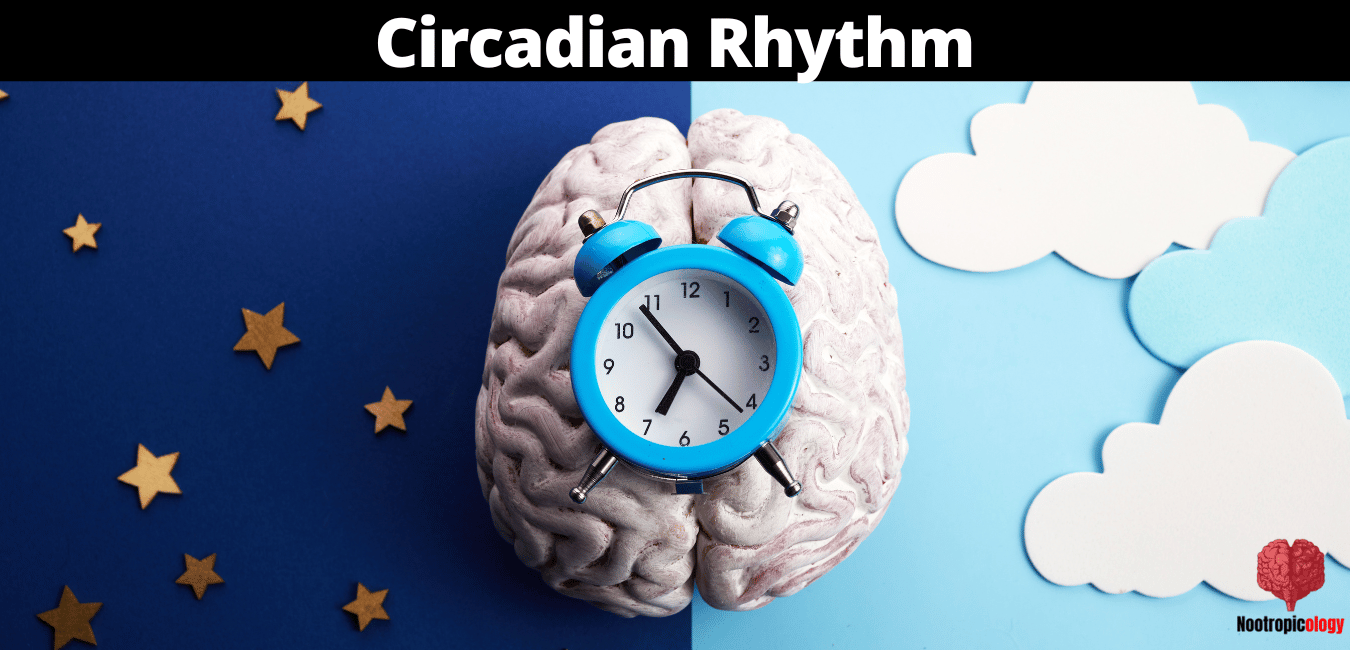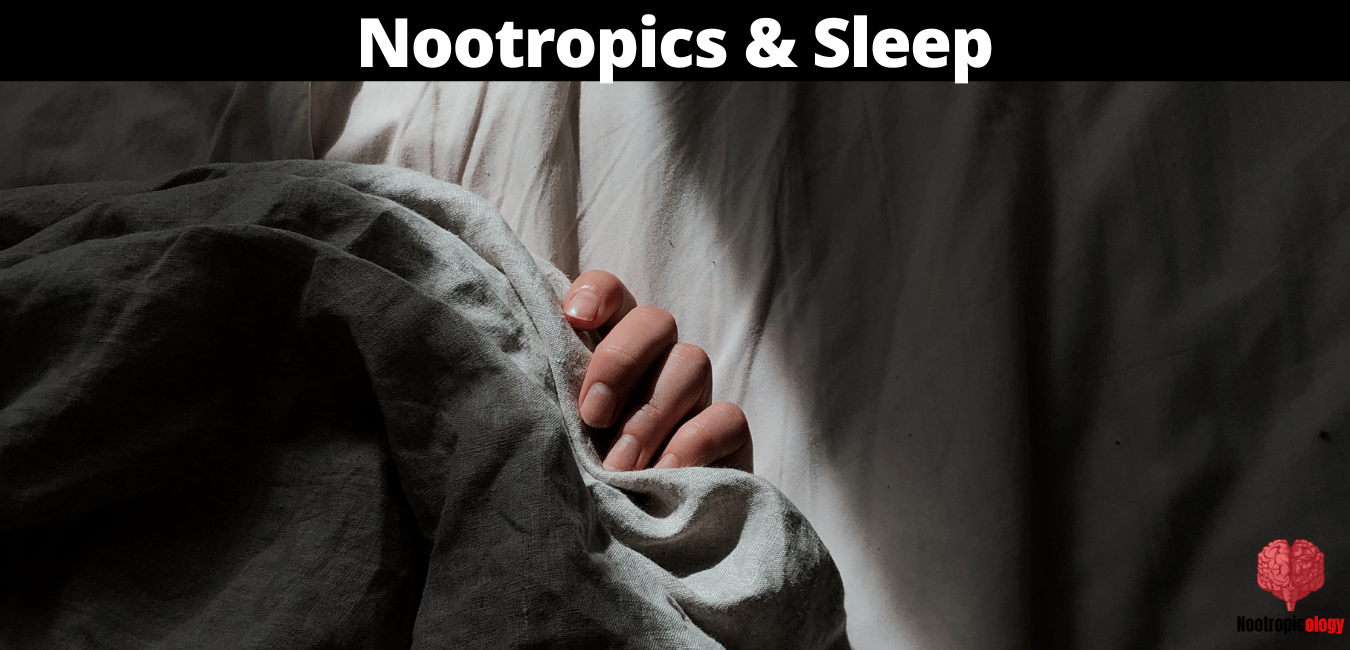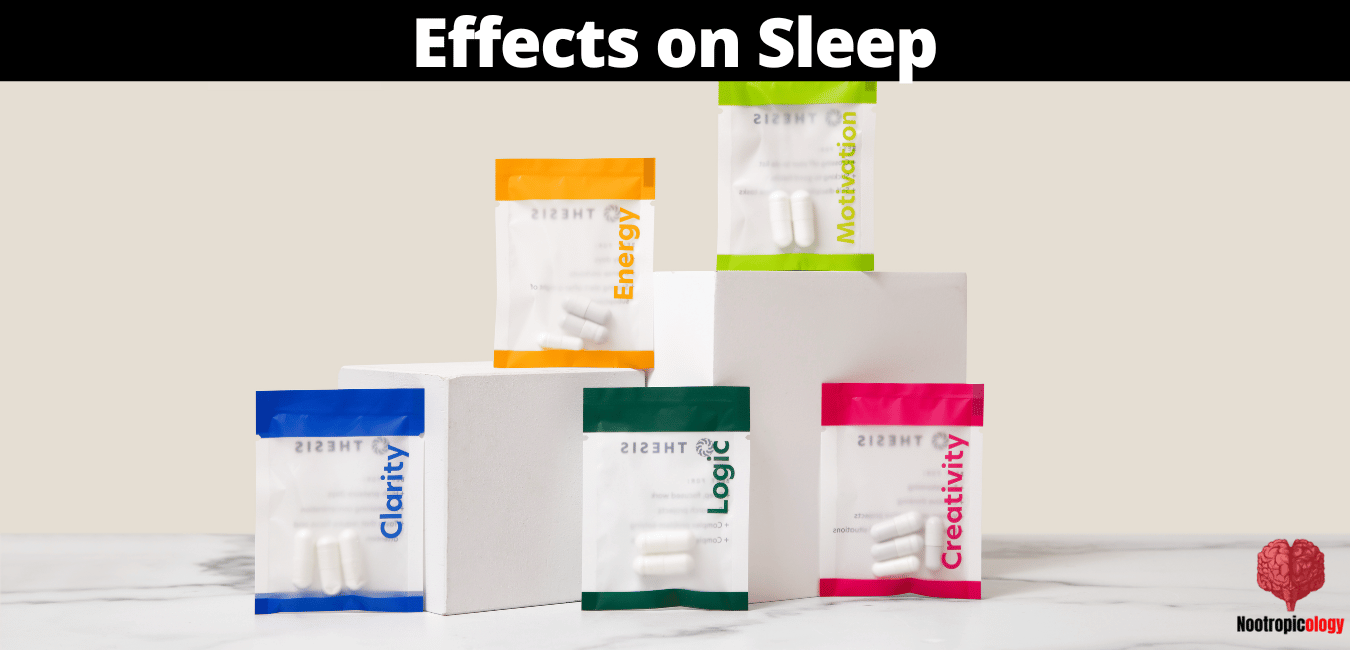
As a curious explorer of the brain's remarkable complexities, I have always been fascinated by the intricate balance between its different states of consciousness.
One area that particularly intrigued me is the role of nootropics in influencing our sleep patterns. Nootropics, often referred to as "smart drugs" or "cognitive enhancers," have been widely studied for their potential to enhance cognitive function, but their impact on sleep is less well understood.
This exploration will delve into the interaction between nootropics and sleep, revealing the effects that these substances can have on our nightly rest.
So without further ado, let's dive in!
How Nootropics Can Influence Sleep

Sleep is a fascinating phenomenon, characterized by changes in brain wave activity, breathing, heart rate, and body temperature. During sleep, we cycle through different stages, each marked by unique physiological changes and distinctive brain waves.
Nootropics, with their ability to modulate brain function, can naturally have an impact on these processes.
Firstly, nootropics such as Modafinil and its R-enantiomer, Armodafinil, are potent wakefulness-promoting agents. They function by inhibiting the reuptake of dopamine in the brain, thereby increasing dopamine concentrations. This increased dopamine activity plays a significant role in enhancing alertness and wakefulness, potentially reducing the desire for sleep or the ability to fall asleep.[1]
On the other hand, nootropics can also have an impact on sleep latency – the time it takes for a person to transition from full wakefulness to sleep. Certain nootropics, like Aniracetam, have been shown to reduce sleep latency, allowing individuals to fall asleep faster. This is particularly relevant for individuals struggling with insomnia or other sleep-onset disorders.
The impact of nootropics on sleep architecture – the structural organization of sleep stages – is also noteworthy. Sleep stages are traditionally divided into rapid eye movement (REM) sleep and non-REM (NREM) sleep, each with distinct characteristics and functions.
Nootropics have the potential to influence the time spent in each of these stages, thereby altering sleep quality. For instance, a study on Piracetam found that it increased the duration of slow-wave sleep (SWS), which is the deepest stage of NREM sleep crucial for physical restoration and memory consolidation.[2]
This is a broad overview of how nootropics can influence sleep. Now, I will delve into the details of specific nootropics and their unique effects on sleep.
Specific Nootropics and Their Effects on Sleep

Navigating the world of nootropics is like traversing a vast ocean - there are numerous substances, each with its unique properties and effects. I will focus on a few notable ones that are specifically associated with sleep.
Modafinil and Armodafinil
As mentioned above, both Modafinil and its R-enantiomer, Armodafinil, are predominantly used to promote wakefulness, especially in individuals with sleep disorders such as narcolepsy and sleep apnea. They work by inhibiting the reuptake of dopamine in the brain, increasing its availability.[3]
This mechanism of action is associated with heightened alertness and reduced need for sleep. Consequently, these substances can potentially disrupt sleep patterns if taken close to bedtime.
Racetams
The racetam family of nootropics, including Aniracetam and Phenylpiracetam, has shown varied effects on sleep. Aniracetam, for instance, has been reported to decrease sleep latency, allowing individuals to fall asleep more quickly. Phenylpiracetam, on the other hand, can enhance the duration of slow-wave sleep (SWS), a stage of non-REM sleep vital for physical restoration and memory consolidation.[4]
It's worth noting that these effects might differ among individuals due to various factors like metabolism, age, and overall health status.
Natural Nootropics: Ashwagandha
Ashwagandha, a revered herb in Ayurvedic medicine, is another noteworthy nootropic. It's primarily known for its adaptogenic properties, helping the body manage stress more effectively. By reducing cortisol levels (a stress hormone that can disrupt sleep), Ashwagandha has shown potential in improving sleep quality and treating insomnia.
One study found that individuals who took Ashwagandha extract reported improved sleep quality and felt more refreshed upon waking.[5]
L-Theanine
L-Theanine, an amino acid predominantly found in tea leaves, is a nootropic known for its calming properties. It enhances the production of GABA, a neurotransmitter that promotes relaxation and reduces neural activity. Additionally, L-Theanine increases the levels of serotonin and dopamine, neurotransmitters that play a key role in sleep regulation. Thus, it may promote sleep onset and improve sleep quality without inducing drowsiness during the day.[6]
These examples provide a glimpse into the diverse world of nootropics and their unique effects on sleep. As with any substance, the effects can vary greatly among individuals, and it's always recommended to consult with a healthcare professional before starting a new regimen.
The Role of Nootropics in Circadian Rhythm Regulation

Our bodies operate on an approximately 24-hour cycle known as the circadian rhythm. This internal "clock" regulates many physiological processes, including sleep-wake cycles, hormone secretion, body temperature, and metabolism. As such, any factor that influences the circadian rhythm can potentially have a profound effect on our sleep.
Nootropics, with their ability to modulate brain function and neurochemistry, are among these factors:
- Modulating Melatonin Production: Melatonin is a hormone that plays a critical role in sleep regulation. Its production and release are influenced by light and dark cycles, increasing in the evening as it gets dark to promote sleepiness, and decreasing in the morning as light exposure promotes wakefulness. Certain nootropics, such as the natural supplement Tart Cherry, are known to increase melatonin levels and could potentially help adjust sleep-wake cycles, particularly in cases of jet lag or shift work sleep disorder.[7]
- Adapting to Shift Work and Jet Lag: Substances like Modafinil and Armodafinil, by promoting wakefulness, can potentially help individuals adjust to new sleep-wake schedules, as required in shift work or jet lag. However, it's important to note that these substances do not replace the need for sleep; they merely alter the perception of tiredness.
- Influencing the "Master Clock": The circadian rhythm is regulated by an area of the brain called the suprachiasmatic nucleus (SCN), often referred to as the "master clock." Nootropics could potentially influence the functioning of the SCN and, therefore, the circadian rhythm. For example, racetams have been suggested to affect neuronal membrane fluidity and might influence the signals sent by the SCN.
The role of nootropics in circadian rhythm regulation is a complex and intricate subject, and further research is needed to fully understand their impact. Nonetheless, their potential to influence our internal "clock" offers promising prospects for managing sleep disorders and optimizing sleep.
Scientific Studies on Nootropics and Sleep
Scientific research plays a pivotal role in our understanding of the interaction between nootropics and sleep.
Let's delve into some of the key studies that have contributed to this field below:
- Modafinil and Armodafinil: Both of these substances have been extensively researched, primarily for their effectiveness in treating sleep disorders such as narcolepsy and obstructive sleep apnea. A systematic review published in the MSM (Medical Science Monitor) Journal concluded that Modafinil effectively reduces excessive sleepiness in patients with narcolepsy. However, the impact on sleep architecture was less clear, with some studies suggesting a potential reduction in total sleep time.[8]
- Racetams: The effect of Aniracetam and Phenylpiracetam on sleep has also been explored. A study conducted on rats demonstrated that Aniracetam could decrease sleep latency and increase the duration of slow-wave sleep (SWS). Similarly, Phenylpiracetam was found to prolong SWS and REM sleep, suggesting potential improvements in sleep quality.
- Ashwagandha: A double-blind, randomized, placebo-controlled study published in the Journal of Ethnopharmacology found that Ashwagandha root extract improved sleep quality and helped manage insomnia in adults. Participants reported improved sleep scores and felt more refreshed upon waking.[9]
- L-Theanine: A study published in Frontiers in Nutrition found that L-Theanine not only improved sleep quality but also reduced nighttime awakenings. Interestingly, the researchers also noted that L-Theanine did not cause daytime drowsiness, making it a potential candidate for enhancing sleep without disrupting daytime alertness.[10]
Nootropics as a Potential Treatment for Sleep Disorders
Given the potential of nootropics to influence sleep patterns and circadian rhythm, it is logical to investigate their role in treating sleep disorders. Let's explore this potential in more detail.
- Narcolepsy and Sleep Apnea: Modafinil and Armodafinil have been approved by the FDA for treating excessive daytime sleepiness associated with narcolepsy and obstructive sleep apnea. They increase wakefulness, allowing individuals with these disorders to maintain a more regular sleep-wake schedule. However, while these substances can reduce the symptoms of these conditions, they do not treat the underlying causes.
- Insomnia: Certain nootropics, such as Aniracetam and Ashwagandha, have shown potential in treating insomnia. By reducing sleep latency and improving sleep quality, these substances could potentially help individuals struggling to fall asleep or maintain sleep.
- Shift Work Sleep Disorder and Jet Lag: The ability of certain nootropics, particularly Modafinil and Armodafinil, to promote wakefulness and adjust the sleep-wake cycle could be beneficial for individuals experiencing shift work sleep disorder or jet lag. These substances may help individuals adapt to different sleep schedules, although they do not replace the need for sleep.
- Sleep-related Breathing Disorders: Emerging research suggests that nootropics might be used in the management of sleep-related breathing disorders, such as obstructive sleep apnea. The wakefulness-promoting effects of Modafinil, for instance, can help manage excessive daytime sleepiness, a common symptom in these disorders.
Precautions When Using Nootropics for Sleep
While nootropics offer potential benefits for sleep enhancement and the treatment of sleep disorders, they should be used with caution. Here are some key precautions to bear in mind:
- Consult a Healthcare Provider: It's crucial to consult with a healthcare provider before starting any new regimen involving nootropics. This is particularly important if you have a pre-existing health condition, are pregnant or breastfeeding, or are currently taking any other medications. Your healthcare provider can provide advice tailored to your specific situation and needs.
- Be Aware of Potential Side Effects: Nootropics can have side effects, which can range from mild (such as headaches or digestive upset) to more severe (such as insomnia or anxiety). Some nootropics, like Modafinil, can also potentially interfere with the quality of your sleep if taken too close to bedtime.
- Understand the Potential for Tolerance and Dependence: With some nootropics, there is a risk of developing tolerance (where higher doses are needed for the same effect) or dependence. It's important to use nootropics responsibly and to avoid excessive or prolonged use.
- Respect Dosage Recommendations: Each nootropic has its own recommended dosage range, and it's important to adhere to these recommendations. Taking too much can increase the risk of side effects, while taking too little may not provide the desired benefits.
- Be Aware of Interactions: Nootropics can interact with other substances, including prescription medications, over-the-counter drugs, and even certain foods. Be sure to discuss potential interactions with your healthcare provider.
Nootropics, like any other substances that can affect our physiology, need to be used wisely and responsibly. The potential benefits they offer should always be balanced against the potential risks and side effects.
My Final Thoughts
The realm of nootropics and their potential impact on sleep is an intriguing landscape, filled with myriad possibilities. As I've delved into this topic, it's become apparent that nootropics can indeed have a profound influence on our sleep - from altering sleep latency and architecture to affecting our circadian rhythm.
Through my exploration, I've learned that some nootropics, like Modafinil and Armodafinil, can increase wakefulness and potentially disrupt sleep, especially when taken close to bedtime. Conversely, others such as Aniracetam, Ashwagandha, and L-Theanine might help reduce sleep latency and enhance sleep quality. It's clear that the effects of nootropics on sleep are as diverse as the substances themselves.
I've also seen that nootropics could potentially play a role in treating sleep disorders. Their ability to promote wakefulness and modulate sleep-wake cycles could be beneficial for conditions like narcolepsy, sleep apnea, shift work sleep disorder, and jet lag. However, it's important to remember that while nootropics may help manage symptoms, they are not a cure for these disorders.
But what resonates with me most strongly is the need for caution and responsibility when using nootropics for sleep. Their potential benefits must be balanced against the potential risks and side effects. It's crucial to consult with a healthcare provider, respect dosage recommendations, and understand the potential for tolerance and dependence.
In the end, I see nootropics as potential tools in our sleep health toolkit - not as magic bullets, but as components of a holistic approach to sleep optimization. Their use should be integrated with other key elements like good sleep hygiene, a healthy diet, regular exercise, and stress management.
Exploring the intersection of nootropics and sleep has been an enlightening journey for me, one that underscores the complex interplay of our brain chemistry, sleep, and overall well-being. As always, science continues to unfold, and I eagerly anticipate the new insights that future research will bring to this fascinating field.
- Volkow, Nora D et al. “Effects of modafinil on dopamine and dopamine transporters in the male human brain: clinical implications.” JAMA vol. 301,11 (2009): 1148-54. doi:10.1001/jama.2009.351
- Wetzel, W. “Effects of nootropic drugs on the sleep-waking pattern of the rat.” Biomedica biochimica acta vol. 44,7-8 (1985): 1211-7.
- Darwish, Mona et al. “Armodafinil and modafinil have substantially different pharmacokinetic profiles despite having the same terminal half-lives: analysis of data from three randomized, single-dose, pharmacokinetic studies.” Clinical drug investigation vol. 29,9 (2009): 613-23. doi:10.2165/11315280-000000000-00000
- Kimura, M et al. “Effects of aniracetam on impaired sleep patterns in stroke-prone spontaneously hypertensive rats.” Psychiatry and clinical neurosciences vol. 54,3 (2000): 314-6. doi:10.1046/j.1440-1819.2000.00693.x
- Cheah, Kae Ling et al. “Effect of Ashwagandha (Withania somnifera) extract on sleep: A systematic review and meta-analysis.” PloS one vol. 16,9 e0257843. 24 Sep. 2021, doi:10.1371/journal.pone.0257843
- Rao, Theertham P et al. “In Search of a Safe Natural Sleep Aid.” Journal of the American College of Nutrition vol. 34,5 (2015): 436-47. doi:10.1080/07315724.2014.926153
- Howatson, Glyn et al. “Effect of tart cherry juice (Prunus cerasus) on melatonin levels and enhanced sleep quality.” European journal of nutrition vol. 51,8 (2012): 909-16. doi:10.1007/s00394-011-0263-7
- Golicki, Dominik et al. “Modafinil for narcolepsy: systematic review and meta-analysis.” Medical science monitor : international medical journal of experimental and clinical research vol. 16,8 (2010): RA177-86.
- Langade, Deepak et al. “Clinical evaluation of the pharmacological impact of ashwagandha root extract on sleep in healthy volunteers and insomnia patients: A double-blind, randomized, parallel-group, placebo-controlled study.” Journal of ethnopharmacology vol. 264 (2021): 113276. doi:10.1016/j.jep.2020.113276
- Dasdelen, Muhammed Furkan et al. “A Novel Theanine Complex, Mg-L-Theanine Improves Sleep Quality via Regulating Brain Electrochemical Activity.” Frontiers in nutrition vol. 9 874254. 5 Apr. 2022, doi:10.3389/fnut.2022.874254
source https://nootropicology.com/do-nootropics-affect-sleep/

No comments:
Post a Comment